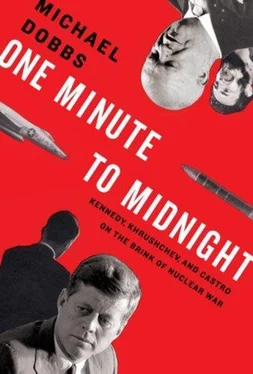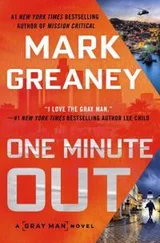The missiles were pointed at the night sky, glistening in the moon-light, like stouter versions of the palm trees all around. Instead of feather-like leaves, the rockets sprouted sharpened cones, like the top of a pencil. Rain beat down on the soldiers as they completed the final preparations for launch. Trucks with fuel and oxidizer roared up to the launch positions, and connected their hoses to the rockets.
The control officer clicked his stopwatch, and ordered a halt to the exercise. That was enough for one night. There was no point fueling the rockets until the arrival of the live warheads. The missile crew had shown that they could successfully reach Readiness Condition 2, sixty minutes from launch.
The missiles were hauled back down from the vertical position and dragged back inside the tents. Exhausted soldiers crawled back inside their tents to sleep. The only evidence of the intense nighttime activity was a series of deep ruts in the mud left by fuel trucks and missile trailers driving across the rain-soaked fields.
The rocket forces commander, Major General Igor Statsenko, had moved to his underground command post in Bejucal. He still did not have a secure landline communication link with Sidorov’s regiment at Sagua la Grande. If he received an order to fire from Moscow, he would have to retransmit it by radio, as a coded message.
Statsenko had reasons for both satisfaction and concern on the night of October 24. He had nearly eight thousand men under his command. Once supplied with nuclear warheads, Sidorov’s missiles could destroy New York, Washington, and half a dozen other American cities. The regiment of Colonel Nikolai Bandilovsky, near San Diego de los Banos in western Cuba, would achieve combat-ready status by October 25. The third R-12 regiment, under Colonel Yuri Solovyev, which was stationed closer to San Cristobal, faced a more difficult situation. One of its supply ships, the Yuri Gagarin, had been prevented from reaching Cuba by the blockade. Solovyev’s chief of staff was heading back to the Soviet Union, along with most of the regiment’s fuel and oxidizer trucks.
There was only one reasonable solution under the circumstances. Statsenko would have to juggle the equipment that had already arrived in Cuba to allow Solovyev’s regiment to become combat-ready as soon as possible. He ordered Sidorov and Bandilovsky to transfer some of their fueling equipment to Solovyev.
One other problem remained. U.S. Navy planes had flown directly over all three R-12 missile regiments. Statsenko had little doubt the Americans had discovered all the launch sites. He had planned for just such an eventuality. He wrote out another order.
“Move to reserve positions.”
CHAPTER FIVE
“Till Hell Freezes Over”
3:00 A.M. THURSDAY, OCTOBER 25 (10:00 A.M. MOSCOW; 2:00 A.M. HAVANA)
“The Americans have chickened out,” chortled Nikita Khrushchev. “It seems that Kennedy went to sleep with a wooden knife.”
The other members of the Presidium were accustomed to the first secretary’s colorful turns of phrase. Khrushchev often drew on his Ukrainian peasant heritage to sprinkle his conversation with crude language and aphorisms like “You don’t catch flies with your nostrils,” “Every sandpiper praises his own marsh,” and “All of us together aren’t worth Stalin’s shit.” But this time they were mystified.
“What do you mean ‘wooden’?” asked Deputy Prime Minister Mikoyan, Khrushchev’s closest friend in the leadership.
Like a stand-up comedian whose punch line has fallen flat, Khrushchev had to explain the joke. “They say that when someone goes bear-hunting for the first time, he takes a wooden knife with him, so it is easier to clean his pants.”
Three days into the showdown with the United States, some Soviet officials were wondering who was most in need of a wooden knife: Kennedy or Khrushchev. A Soviet deputy foreign minister told colleagues that Nikita “shit in his pants” when he heard that the Strategic Air Command was moving to DEFCON-2. The head of the KGB would later claim that Khrushchev “panicked” after hearing that the Americans had discovered the Soviet missiles in Cuba, announcing tragically: “That’s it. Lenin’s work has been destroyed.”
Whatever his true mental state, Khrushchev was certainly disturbed by the latest turn of events. He had witnessed a conventional war up close, and had no desire to experience a nuclear one. As a top commissar at the battle of Kharkov in May 1942, he had seen an entire army wiped out unnecessarily because of the mistakes and stubbornness of political leaders. The Soviet Union had lost some 30 million people during the Great Patriotic War. The dead included Khrushchev’s oldest son, Leonid, a fighter pilot shot down in a skirmish with the Luftwaffe. A nuclear war would almost certainly result in even more casualties. The chairman was determined to do everything in his power to avoid plunging his country into another war. But he also understood that there was now a danger of events spinning out of his—and Kennedy’s—control.
Part of the problem lay in his own miscalculation of the likely American response to the deployment of Soviet missiles to Cuba. Khrushchev had assumed that Kennedy would end up grudgingly accepting Soviet missiles in Cuba just as he himself had accepted U.S. nuclear weapons in Turkey and Italy. The Americans would be irritated, even angry, but they would not take the world to the brink of a nuclear war.
“You don’t have to worry; there will be no big reaction from the U.S.,” Khrushchev had told Che Guevara when they first discussed the matter back in July. “And if there is a problem, we will send the Baltic fleet.” When he heard this remark, Che raised his eyebrows in disbelief, but did not protest. He may have thought this was simply another of Comrade Khrushchev’s little jokes. The Russian Baltic fleet was scarcely a match for the U.S. Navy: the last time it had been deployed into foreign waters was in 1904, when it was annihilated by the Japanese imperial navy, one of the greatest military defeats ever inflicted on Russia.
Like his opposite number in the White House, Khrushchev had ordered his armed forces to an advanced state of alert. All military leave had been canceled, and discharges from the army deferred indefinitely.
As he looked down the Presidium table, Khrushchev understood he had to prepare his colleagues for a probable retreat. He had concluded that he had “to dismantle the missile sites.” But he wanted to implement this decision in a way that would permit him to claim that he had achieved his primary objective, the defense of the Cuban revolution. As Khrushchev described the situation, it was Washington, not Moscow, that was backing down.
“We have made Cuba a country at the center of international attention,” he told the Presidium. “The two systems have come head-to-head. Kennedy is telling us to take our missiles out of Cuba. And we reply: ‘Give us firm guarantees, a promise, that the Americans won’t attack Cuba.’ That’s not bad.”
A deal was possible. In return for a noninvasion guarantee, “we could take out the R-12s, and leave the other missiles there.” This was not “cowardice,” merely common sense. “We will strengthen Cuba, and save it for two or three years. In a few years’ time, it will be even harder [for the U.S.] to deal with it.” The important thing now was to avoid bringing the crisis “to the boil.”
There were murmurs of “That’s right” around the table. Nobody dared challenge the first secretary. Khrushchev insisted that the setback, if it was a setback at all, was only temporary.
“Time will pass. If necessary, the missiles can appear there again.”
Читать дальше












